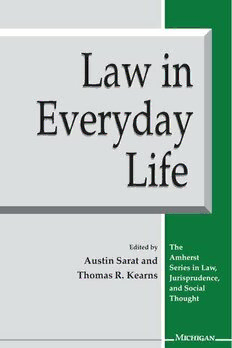
Law in Everyday Life PDF
Preview Law in Everyday Life
Law in Everyday Life The Amherst Series in Law, Jurisprudence, and Social Thought Each work included in The Amherst Series in Law, Jurisprudence, and Social Thought explores a theme crucial to an understanding of law as it confronts the changing social and intellectual currents of the late twentieth century. The Fate of Law, edited by Austin Sarat and Thomas R. Kearns Law's Violence, edited by Austin Sarat and Thomas R. Kearns Law in Everyday Life, edited by Austin Sarat and Thomas R. Kearns The Rhetoric of Law, edited by Austin Sarat and Thomas R. Kearns Law in Everyday Life Edited by Austin Sarat and Thomas R. Kearns Ann Arbor THE UNIVERSITY OF MICHIGAN PRESS Firstpaperbackedition1995 Copyright©bytheUniversityofMichigan1993 All rights reserved PublishedintheUnitedStatesofAmericaby TheUniversityofMichiganPress ManufacturedintheUnitedStatesofAmerica 1998 1997 1996 1995 432 1 Library of Congress Cataloging-in-Publication Data Law in everyday life / edited by Austin Sarat and Thomas R. Kearns. p. em. - (Amherst series in law, jurisprudence, and social thought) Includes bibliographical references and index. ISBN 0-472-10441-1 (alk. paper) 1. Law-United States-Popular works. 2. Law-Philosophy. I. Sarat, Austin. II. Kearns, Thomas R. III. Series. KF387·L374 1993 340'.1-dc20 93-31233 CIP ISBN0-472-08345-7(pbk.:alk.paper) A CIP catalogue record for this book is available from the British Library. ISBN13 978-0-472-10441-3 (cloth : alk. paper) ISBN13 978-0-472-08345-9 (pbk. : alk. paper) ISBN13 978-0-472-02360-8 (electronic) Acknowledgments Law in Everyday Life is the third in a continuing series of books that emerge from, and reflect, the substantive interests in what was ini tially known as the Program in Law, Jurisprudence & Social Thought at Amherst College. Following a recent vote of the Faculty at Amherst, LJST has been accorded permanent departmental status with the right to offer a major, the first such entity at a liberal arts college in the United States. We are grateful to our colleagues at Amherst for theirenthusiastic endorsement of ourwork. This depart ment addresses itself to the historically and culturally specific ways in which legal institutions combine moral argument, distinctive rhe torical and hermeneutic practices, and the social organization of vio lence. Our everyday life has been particularly enriched by Lawrence Douglas and Victoria Saker, each of whom has made substantial contributions to the intellectual perspective reflected in these pages. We have been especially fortunate to enlist a group of distinguished scholars, whose contributions are included in this volume, to address themselves to issues central to the agenda of LJST. Finally, we would like to expressspecial thanks to the Mellon, Keck, and Arthur Vining Davis Foundations without whose generous financial support LJST could not have come into being, and to Amherst's President, Peter Pouncey, for his friendship and enthusiastic engagement with our work. Contents Editorial Introduction Austin Sarat and Thomas R. Kearns 1 Beyond the Great Divide: Forms of Legal Scholarship and Everyday Life Austin Sarat and Thomas R. Kearns 21 Abigail Bailey's Coverture: Law in a Married Woman's Consciousness Hendrik Hartog Reflections on Law in the Everyday Life of Women Catharine A. MacKinnon 109 Law in the Domains of Everyday Life: The Construction of Community and Difference David M. Engel 123 Law and Everyday Life Patricia 1. Williams Autumn Weekends: An Essay on Law and Everyday Life David Kennedy Mass Toxic Torts and the End of Everyday Life George E. Marcus 237 CONTRIBUTORS 275 INDEX 277 Editorial Introduction Austin Sarat and Thomas R. Keams The first two volumes of the Amherst Series in Law, Jurisprudence, and Social Thought surveyed the majesty and monstrosity of law and speculated about its future and its fate.1 They considered the impact of feminism and postmodernism on law and legal theory and attendedto thenatureandconsequencesoflaw'sviolence. Insodoing, they initiated this series with the dramatic and spectacular; they invited readers to see law through the eyes of philosophers, on the one hand, and of those who authorize and experience the force of law, on the other. In Law in Everyday Life, the third volume in the Z series, we take up different questions and assume a different tone. We speak about routine, habit, convention, and the constraints and restraints that each imposes.3 We confront law in its dailiness and as a virtually invisible factor in social life.4 1. SeeAustinSaratandThomasR. Keams, eds., TheFateofLaw(AnnArbor: University ofMichigan Press, 1991); andAustin SaratandThomasR. Keams, eds., Law's Violence (Ann Arbor: University of Michigan Press, 1992). 2. AsRobertCover, "ViolenceandtheWord," YaleLawJoumal95 (1986): 1601, reminds us, these are very different perspectives. 3. ''The everyday implies on the one hand cycles, nights and days, seasons and harvests, activity and rest, hunger and satisfaction, desire and its fulfillment, life and death, and it implies on the other hand the repetitive gestures of work and consumption....The everyday imposes its monotony. It is the invariable constant of thevariationsitenvelops:' SeeHenriLefebvre, "TheEverydayandEverydayness," Yale French Studies 76 (1987): 10. 4. Writing about social research on law, Austin Sarat and Susan Silbey argue that "byfocusing uponlawwhere itattemptsto changesocialbehavior, [researchers) divert attentionfrom theways in which law helps toconstitutesocialpractices; they direct attention away from the ways state law works to stifle resistance before it is voicedso that acquiescencebecomesthe norm....Rarely do theylook to wherelaw is unproblematic, to instances of law-abidingness; sociolegal research seems for the
